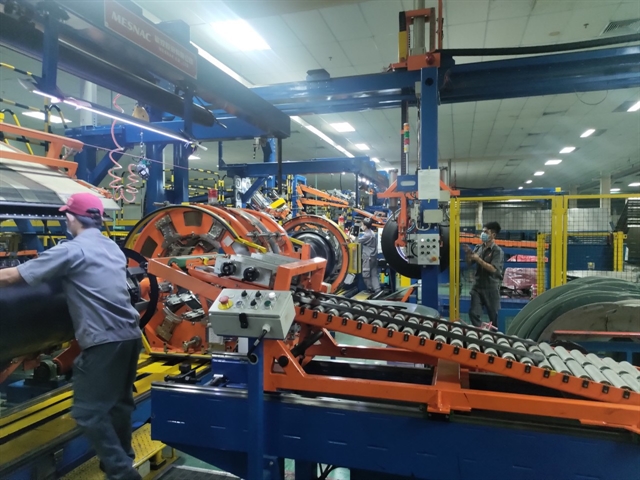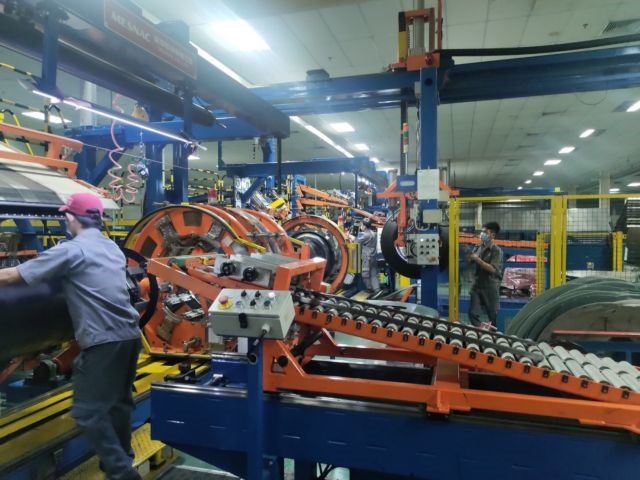[ad_1]

HÀ NỘI — Both global synthetic and natural rubber prices are on an upward trend, but not all businesses in the industry are enough confident to set higher profit targets for this year.
Compared to the beginning of April, the price of this item has increased by 9 per cent. Trading Economics also forecast that the increase in rubber prices will not stop until the end of the first quarter of 2023 and may reach 310.84 yen per kilo.
The price of crude oil on the world market has increased in recent times, pulling up the price of synthetic rubber – a petroleum product.
The rubber supply was also affected after the Organisation of Petroleum Exporting Countries (OPEC) said that the world would not be able to replace about seven million barrels of oil and other liquids lost per day from Russia.
On April 18, 2022, benchmark US crude oil for June delivery was $113.2 per barrel and New York’s main contract, light sweet crude for delivery in May, was $107.93 per barrel.
The price of natural rubber is also supported by world demand in 2022, which is expected to increase by 1.2 per cent compared to 2021, to 14.2 million tonnes.
According to the General Department of Customs, in the first three months of 2022, rubber exports reached 406,800 tonnes, worth $715.39 million, up 0.3 per cent in volume and 6.2 per cent in value over the same period of 2021.
The price trend is likely to increase in the next few months due to the seasonal shortage of supply, according to the forecast of the Việt Nam Rubber Association,
Besides favourable factors from the market, the natural rubber industry is also under certain pressures. The shortage of containers, high transportation costs and slow customs clearance will affect rubber demand.
After a year of failing to complete the annual plan, the Southern Rubber Industry Joint Stock Company (CSM) has set a business plan for 2022 with strong growth. CSM expects revenue to reach VNĐ4.95 trillion, a slight increase of 2 per cent over the same period last year, but profit before tax is expected to reach VNĐ101 billion, up 83 per cent compared to 2021.
To realise the target, CSM managers said that the company will maintain production to meet market demand, including both domestic and exports, at the same time, increase labour productivity for existing product groups, especially investing in small equipment to complete a number of stages in the production line of motorcycle tyres, motorcycle tubes, bias tyres, and auto tubes.
Phước Hòa Rubber Joint Stock Company (PHR) also sets a positive growth target this year with a revenue target of more than VNĐ2.25 trillion and profit after tax of VNĐ744 billion, up 16 per cent and 56 per cent respectively, compared to 2021.
Meanwhile, the DakLak Rubber Investment JSC (DRI) targets total revenue of VNĐ599.6 billion in 2022, a slight increase compared to 2021, but profit after tax is expected to decrease by 5.7 per cent to VNĐ79.2 billion.
DRI Chairman of the Board of Directors Nguyễn Viết Tượng said DRI is managing an area of over 8,800 hectares of rubber plantations in Laos with loans mainly in Lao kip. By the end of 2021, DRI’s total debt was more than VNĐ256 billion, so the company would be at risk in exchange rates. In case the kip depreciates, DRI’s revenue will also be affected. In addition, logistics costs will become high due to the sharp increase in raw material prices, which is also a disadvantage for DRI.
Đà Nẵng Rubber Joint Stock Company (DRC) also forecasts revenue in 2022 to decrease slightly to VNĐ4.4 trillion and profit after tax to decrease by 12 per cent to VNĐ256 billion compared to the previous year.
DRC said it still faced a labour shortage at some production stages because of the COVID-19 pandemic; empty containers and high rental prices; and high transportation costs which cause the purchase price of raw materials to increase sharply. In particular, the conflict between Russia and Ukraine caused oil prices to rise, pushing up prices of raw materials and goods, and DRC’s import and export activities into these two markets were also disrupted.
This year, DRC will focus on products that are the company’s strengths in the domestic market to improve production and business efficiency such as off–the-road (OTR) tyres and construction tyres. DRC’s goal is to cover all segments in the domestic market as well as increase sales opportunities in export markets.
Positive first quarter
Plenty of rubber companies have recorded positive Q1 earning results compared to the previous year.
In the first quarter, thanks to a sharp increase in the selling price of finished products compared to 2021, DakLak Rubber Investment JSC (DRI) recorded net revenue of VNĐ134 billion, up 8 per cent, in which, revenue from finished rubber products reached VNĐ130.6 billion, the rest was from bananas and cashews.
The company’s profit after tax was VNĐ20.8 billion, up 27 per cent year-on-year. With the results achieved, DRI has completed 22.3 per cent of the year’s revenue target and 26 per cent of the profit target.
Phước Hòa Rubber Joint Stock Company (PHR) said that in the first quarter of this year, the parent company recorded net revenue of VNĐ302.6 billion, up 25 per cent compared to the same period in 2021, but profit after tax reached VNĐ240 billion, 11.3 times higher than the same period last year and completed 33 per cent of the yearly plan.
Đà Nẵng Rubber Joint Stock Company (DRC) earned net revenue of VNĐ1.28 trillion in Q1, profit before tax of VNĐ81.7 billion, up 40.6 per cent and more than 3 per cent, respectively. Entering the second quarter, the company set a business plan similar to the first quarter, with net revenue of 1.25 trillion, profit before tax reaching VNĐ80 billion. — VNS
[ad_2]
Source link
